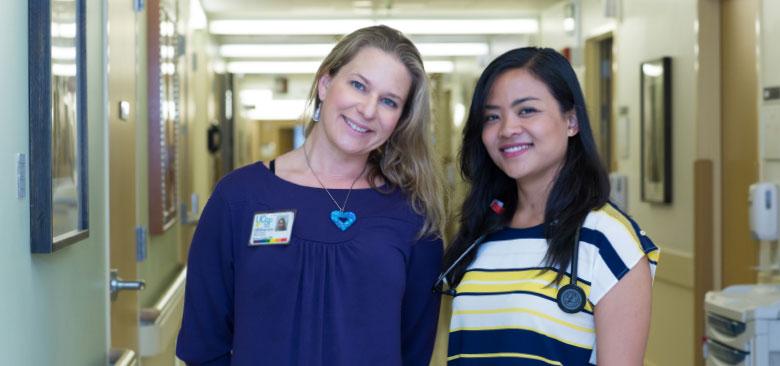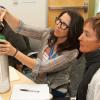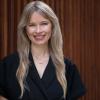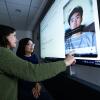
Remy Paille (left) and Laurensia Widyastami (photo by Elisabeth Fall)
Geriatric Surgical Health Coaching Teaches the Value of Team-Based Care
Before pursuing our advanced practice degrees, both of us worked as registered nurses (RNs) – Laurensia in an inpatient medical-surgical unit of a busy hospital, Remy in an acute rehabilitation unit. In those roles, we became intensely aware that our health system does not properly address the needs of older adults who need major surgery. Instead of recovering as expected and, where possible, returning to their homes in the community, many frail surgical patients experience extended acute rehabilitation or indefinite skilled nursing facility stays. We came to believe that many postoperative complications – such as delayed wound healing and infections, delirium and postoperative falls – are preventable with some anticipatory guidance, education and carefully planned preparation.
With that in mind, during our master’s degree program we embraced a unique opportunity to help facilitate this type of care by becoming geriatric surgical health coaches as part of an integrated team in the Geriatric Surgical Wellness (GSW) program at UCSF Medical Center. The team also included a geriatrician, a registered dietician (RD), a physical therapist (PT) and an occupational therapist (OT).
How It Works
After referral to the GSW, each patient begins with a two-hour appointment that includes a team-based evaluation. The RD provides dietary guidelines that aim to achieve blood sugar balance while increasing protein and fiber intake to facilitate healing. The PT provides preoperative exercises focused on improving each patient’s cardiorespiratory fitness, strength and balance, with an eye toward preventing postoperative falls. The OT provides equipment suggestions and insights into how to make the patient’s home as safe and functional as possible. The geriatrician addresses goals of care and end-of-life planning, including education on advance directives.
Our role as health coaches was to serve as the primary point of contact and guide for patients as they process a barrage of what can appear to be confusing, intimidating and frightening information. That role began at the end of the lengthy first appointment, when we reviewed the information with the patient and clarified any ambiguities. In the time between that initial appointment and the day of surgery, we also allayed patients’ fears and concerns, while simultaneously monitoring their progress and adherence to the clinical recommendations. This also enabled us to serve as a bridge to the clinical team, securing new or modified recommendations when the patient struggled to adapt to the initial guidelines.
For example, during a check-in call, if a patient expressed difficulty doing a recommended 30-second single leg stand because of balance issues, we could give him or her a modified version with a more readily attainable goal. More dramatic was the time Laurensia had concerns about an 88-year-old man who had made little progress on his diet and exercise recommendations because of chronic pain, poor health literacy and mild cognitive impairment. Two days before his scheduled surgery, the patient did not appear to understand the procedure and expected recovery despite an earlier meeting with his care team just a couple of days before. Laurensia alerted the GSW team as well as the patient’s social worker, who seconded Laurensia’s concerns. They made an appointment with UCSF’s Symptom Management Service (SMS) to discuss the patient’s goals of care and secured a consultation with a specially trained physician who helped determine whether the patient was competent to make decisions about his medical care and if it was ethical to proceed with the surgery. After these appointments, the patient decided not to pursue surgery but to manage his condition with the SMS. This intervention may well have averted needless suffering on the part of the patient and used the most appropriate features of the health care system.
Though the benefits are not always as dramatic or clear-cut as they were in this case, we believe the health coach program does play a significant role in improving patient outcomes and, in some cases, avoiding costs. As for patient satisfaction, during our weekly conversations with patients, they would express profound gratitude that a person from their medical team was calling and checking on them regularly.
Training Is Essential
Prior to joining the team, we received training in a number of different areas. Our nurse practitioner program provided seminars on motivational interviewing, which taught us how to determine a patient’s readiness for change and how to work with patients who were either frightened of the health care system or appeared ambivalent. We also received complementary training through the GSW program, where we learned how to properly support the patient while providing timely and pertinent information about his or her physical, social and mental status.
We learned as well how to work as part of an interdisciplinary team. Although the health coaches were the main point of contact for the patient, the entire medical team was available at any moment if the health coaches became concerned about a patient’s status. The phrase “load the boat” – which fifth-year surgical resident Jenny Kaplan shared – encapsulates a key idea: If and when you have a concern or a new piece of information, don’t keep it to yourself – reach out for help and load the boat with as many people as necessary to continue making forward progress.
As future adult-gerontology primary care nurse practitioners, we found that serving as health coaches was an ideal way to learn about the benefits of a multidisciplinary, team-based approach when managing frail patients. Our role on this team allowed us to develop genuine relationships that put the patient at the center of comprehensive and holistic care, and we came away from this experience with a deeper understanding of the extraordinary importance of patient advocacy.
Laurensia Widyastami and Remy Paille graduated from the UCSF School of Nursing Adult-Gerontology Primary Care Nurse Practitioner program in June 2017, with an Occupational/Environmental Health focus.



